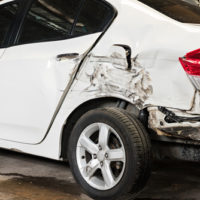Who is at Fault in a Bad Weather Car Accident?

Florida is one of the few states in the nation that enjoys consistently nice weather year-round. However, that does not mean that it is immune to bad weather. In fact, when the Sunshine State does experience inclement weather, the conditions are typically much more severe than those experienced anywhere else throughout the country, which means that the road conditions are exponentially worse as well. While most transportation agencies recommend motorists stay off the road when weather turns bad, sometimes staying off the road is simply not possible. If you were out and about in torrential rains, high winds, or other poor conditions, and if you were involved in a car accident, you may want to know who is to blame. Our Miami car accident attorneys explore liability in bad weather accidents in this post.
Factors That May Affect Liability in Bad Weather Car Accidents
When an insurance company receives a car accident claim, the first thing it will do is review all circumstances of the incident. Factors it will look to when assessing the claim include:
- Evidence such as photographs, eye-witness testimonies, and breath-test results;
- Police reports, which may detail the speed at which both vehicles were traveling, whether one or both vehicles failed to signal, whether one or both parties failed to abide by street signs or signals, etc.;
- Possible negligence of one or both parties;
- Insurance coverage carried by both parties; and
- Road and weather conditions.
For example, say your car hydroplaned into oncoming traffic and caused a head-on collision. In your opinion, the accident would not have happened had the road been dry, but in the insurance company’s opinion, the wet roads were just one of many factors that played into the accident. The insurance company would want to know if you were speeding, if you were distracted at the time of the incident, and if you ran a stop sign, amongst other things. On the same token, it would want to know if the other party was negligent in some way. Could the accident have been avoided had the other driver not ran a red light, not been speeding, or had his or her headlights turned on? The answers to these questions will all come into play when the insurance company assesses liability for the accident.
Drivers’ Duty of Care
Unfortunately, in the eyes of the insurance company and the law, drivers always have the responsibility of maintaining control regardless of the road conditions. Though poor road conditions can certainly contribute to an accident, drivers must take extra precautions when driving in bad conditions. This may mean driving slower than the posted speed limit, braking well in advance of stopping, driving with the headlights on even in the daytime, and pulling over to the side of the road when the conditions become particularly poor. Some other measures drivers can take to stay safe in poor driving conditions include the following:
- Maintain the vehicle and ensure that the tires are good, the windshield wipers work, and the brakes are safe;
- Refrain from any sort of distracted driving, including texting or talking while driving, listening to loud music while driving, changing the radio station while driving, or eating while driving;
- Avoid driving recklessly or aggressively;
- Avoid driving over the posted speed limit;
- Obey all traffic signals and road signs; and
- Refrain from driving while impaired.
If you or the other driver failed to do any of the above while driving in poor weather conditions, the insurance company might determine that shared liability is appropriate. If that is the case, recovery would then come down to who was more negligent—the defendant or the plaintiff. The plaintiff’s damages would then be reduced to reflect his or her contribution to the injury.
Work With an Experienced Miami Car Accident Lawyer
If you were involved in a bad weather car accident, you may feel as if you are not to blame (or at least, not completely) for the incident. Unfortunately, the insurance company does not care that the road conditions were poor – what it cares about is that you were driving in a safer manner than the other party. Our team at Spencer Morgan Law can review the evidence and determine whether or not you have a case. If you do, we will strive to prove that the other party was more negligent and negotiate with the insurance company for a fair settlement. For a free case evaluation, contact our firm today.
